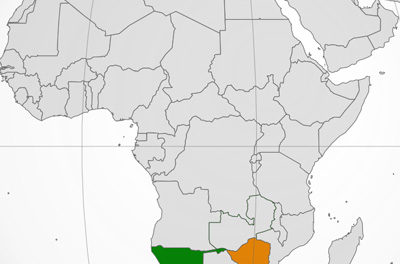
BLNS countries enter duty-free trade Economic Partnership Agreement with European Union
The EU has entered into a development-oriented agreement with five southern African countries that will ensure immediate duty- and quota-free access for their exports to the EU market. Trade representatives from Botswana, Lesotho, Namibia, South Africa and Swaziland, earlier this month finalised the Economic Partnership Agreement with the EU, ushering in a new chapter in the bilateral relations between the BLNS, South Africa and the European Union. Trade experts view this arrangement as a door-opener for the EU to enter into similar agreement with other countries in the Southern African Development Community.
The agreement will apply only to trade between the EU and the five countries. Mozambique is in the process of ratifying the agreement and will join in as soon as the ratification procedure is completed.
The EU Commissioner for Trade Cecilia Malmström said: “When I visited Botswana in June for the signing ceremony, I saw first-hand how important it is to build a stable trade partnership between Europe and Africa. Today we’re taking a crucial step towards making that a reality. The agreement that we’re putting in place will support sustainable economic growth and regional integration in southern Africa and is designed to help lift people out of poverty in the years to come. Africa is the emerging continent and the Economic Partnership Agreements have been designed to maximize this dynamism.”
The Commissioner for International Cooperation and Development, Neven Mimica, added:”Jobs and sustainable economic growth, that is what the EPA can help deliver. Private sector development and trade are significant drivers to lift people out of poverty and implement the new global agenda of Sustainable Development Goals. The EPA can contribute to regional economic integration, an enabling business environment and improved competitiveness of the region.”
The EPA takes into account the different levels of development of the partners. It gives Botswana, Lesotho, Mozambique, Namibia, and Swaziland duty-free, quota-free access to the European market. South Africa will also benefit from enhanced market access, going beyond its existing bilateral arrangement with the EU.
The southern African markets will open only partially to EU exports, gradually over time, providing their industries with the intermediary goods they need to support growth. It also provides for a number of protective measures in these countries, for instance for nascent, fragile industries or for food security reasons. Furthermore, the agreement increases the flexibility of southern African producers to put together products with components from various other countries, without the risk of losing their free access to the EU market.
The EU is the largest trading partner of the SADC EPA group. In 2015, the EU imported goods worth almost €32 billion from the region, mostly minerals and metals.
The EU exported goods of nearly the same value, consisting mostly of engineering, automotive and chemical products. Total trade between the EU and the SADC EPA Group (including Angola) amounts to €63 billion.
The EPA creates joint institutions to support dialogue, smooth handling of all trade issues, and monitoring of the impact of the trade deal. The EU will work with its SADC partners to ensure smooth implementation of the agreement, together with regional and national development cooperation bodies.











































